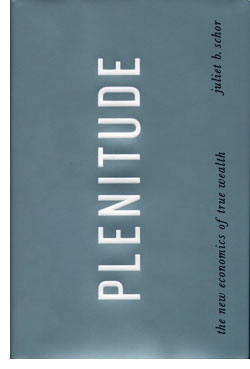 |
 |
 Juliet Schor
Juliet Schor
Plenitude: The New Economics of True Wealth
Reviewed by: Rick Kleffel © 2010
Penguin Press / Penguin Putnam
US Hardcover First Edition
ISBN 978-1-594-20254-0
Publication Date: 05-13-2010
272 Pages; $25.95
Date Reviewed: 04-22-10
Index:
Non-Fiction
There's a lot more science fiction about than our society would like to admit. We'd be happy relegating the world of "sigh-fi" to cheesy blockbusters, novels with lurid cover images, hyper-violent video games and turgid television. If only we could keep our tendency to pretend that we can predict the future to those low-brow, low-ball venues. We'd be a lot less likely to mislead ourselves into, for example, a massive economic breakdown!
But we can't confine our inclination to science fiction to the science fiction genre. And so we have those who happily sit on their hands while we under-tax and overspend our way blithely towards economic meta-catastrophe. We predict in the year, say 2010, what things will be like in say 2030, even 2020. A crushing debt will come upon us like unto a plague, and lo, all our houses shall be triple-mortgaged then foreclosed. Yea, the rich shall walk the streets in slightly less regal splendor while around them the ever-growing sea of poverty shall engulf the middle class! Woe are we! Woe are we! We must not allow a mine-shaft gap!
You write that stuff in a novel, they call it sigh-fi. You put it on the opinion page and they call it economic forecasting. Let me remind readers and listeners of the ever-present truth of the matter, as related by one Kim Stanley Robinson: "We are living in a bad science fiction novel."
And where does that leave Juliet B. Schor and her book 'Plenitude' (Penguin Press / Penguin Putnam ; May 17, 2010 ; $25.95)? It certainly appears to be a sobering look at what's to come, and as if to enforce the message of the title, my copy came with not one, not two, but three dust jackets.
But despite the optimistic-sounding title, Schor seems a bit more connected to the world as she actually is than many who write science fiction in the guide economic and social theory. Schor is no advocate of the 'Dow: Ten Zillion" school; she's no zealot from the Pericalyptic school of the-end-has-already-come. Schor instead, suggests that the world is currently in the shape it is already in! And that is not so hot; nor is it mind-bendingly bad. What it is, she says, is something we can live with — so long as we can re-jigger our expectations and look for growth other than Big, Fast Money. Cos you know what? We just burned up a boatload of that stuff, and it ain't coming back.
Schor's exercise into speculative fact is based on a sobering view of how economics collides with ecology. You can imagine that that latter will win and the results are not pretty, at least not for a world where the expectation is that things will get continuously better. You'll meet the entertaining and mis-informed Environmental Kuznets Curve, which suggested that it was all going to work out. Oops. Not quite. You'll meet the rebound effect, and have you mind dusted by the fact that the BAU (business as usual) economy just can't be sustained. In other words, our grandkids will not be living in a bigger house cleaned by robots.
There's a solution, of course, and thankfully Schor does not offer us a "Get Out of Jail Free" card. Instead, she offers a sensible combination of lowering our expectations and diversifying our interests and not our investments, which in the BAU world are likely to head straight down the Big Swirly. Nope — no jet pack either. In fact, you're going to look back at air travel of the 1960's and realize that was the pinnacle of that particular combination of technology and economy. Fly the friendly skies? Make sure your underwear is clean. You're on Candid Camera!
Schor talks about changing our lives in ways that focus on self-development and social wealth as opposed to figuring out how we can make more money. My co-host on Talk of the Bay, here in Santa Cruz, Kelly O'Brien, does a lot of shows about alternative transportation and is already investigating one of the suggestions in 'Plenitude' — she's considering converting her Prius to a plug-in. It's just a piece of the puzzle; Schor also talks about how the BA cycle leads to less time for social connection and suggests that our perceptions of a rich life can profit more from social connections than economic connections.
It is possible that we are already in the midst of not the End, but the Beginning. The Beginning is Near – coming to a sandwich sign near you. By the way; don't expect all those lost jobs to come back. There's one governmental legacy that is not likely to go away.
|
 |
|
|
 |
| |
Review Archive
All Reviews alphabetized by author.
General Fiction
Non-Genre, general fiction and literature.
Horror
Supernatural fiction, supernatural horror and non-supernatural horror.
Science Fiction
Science fiction, science fantasy, speculative fiction, alternate history.
Fantasy
Fantasy, surrealism and magic realism.
Mystery
Crime, thrillers, mystery, suspense.
Non-Fiction
Non-Fiction, True Crime, Forteana, Reference.
Poetry
|
|
 |
|




